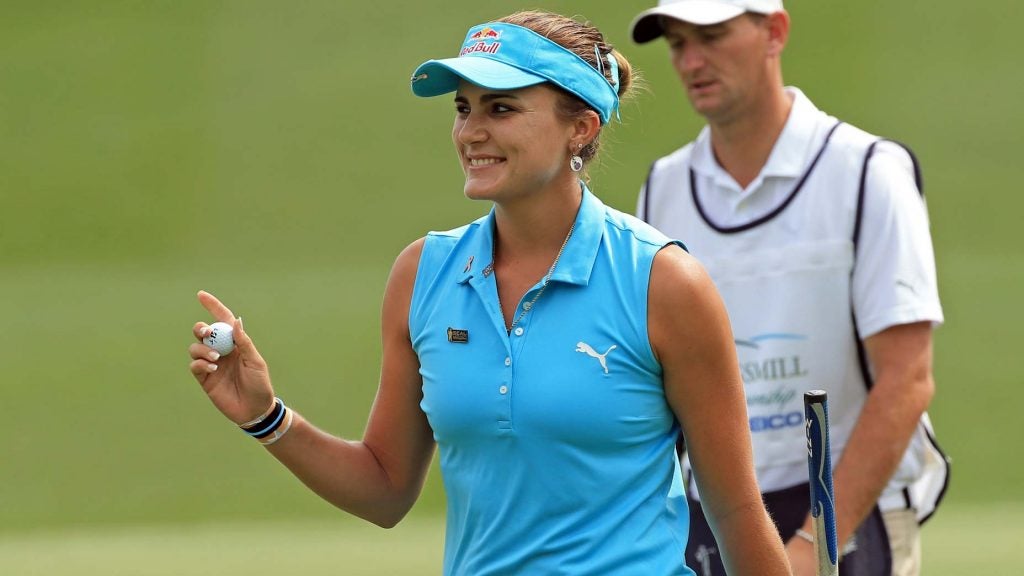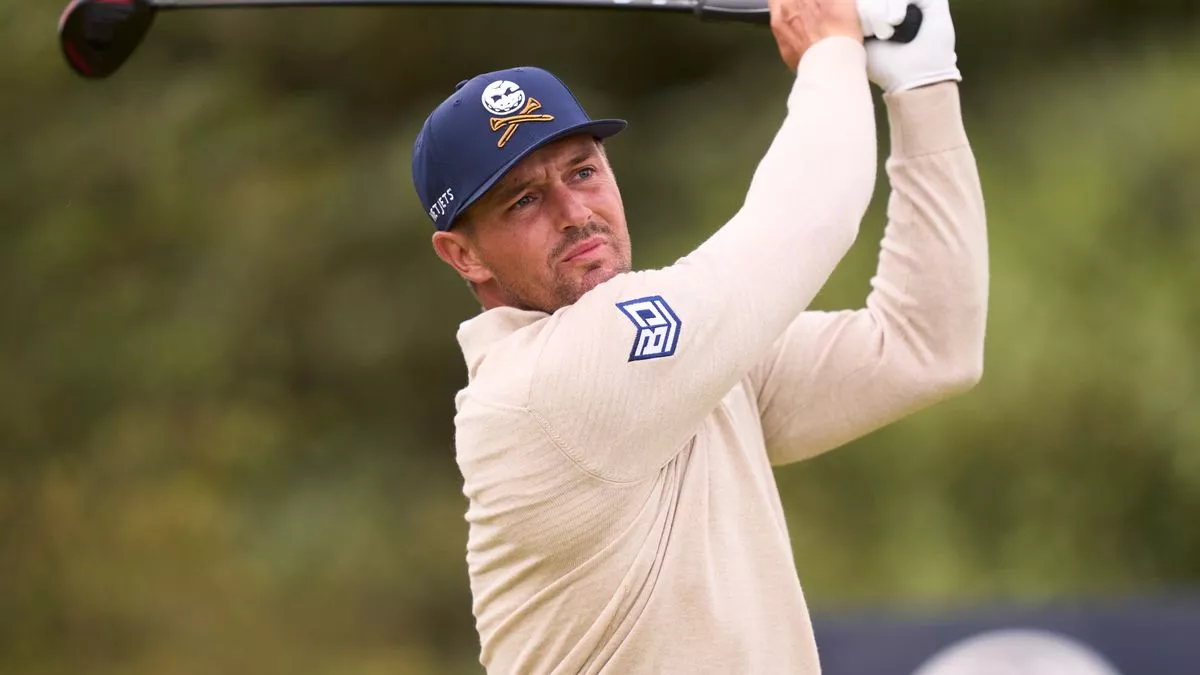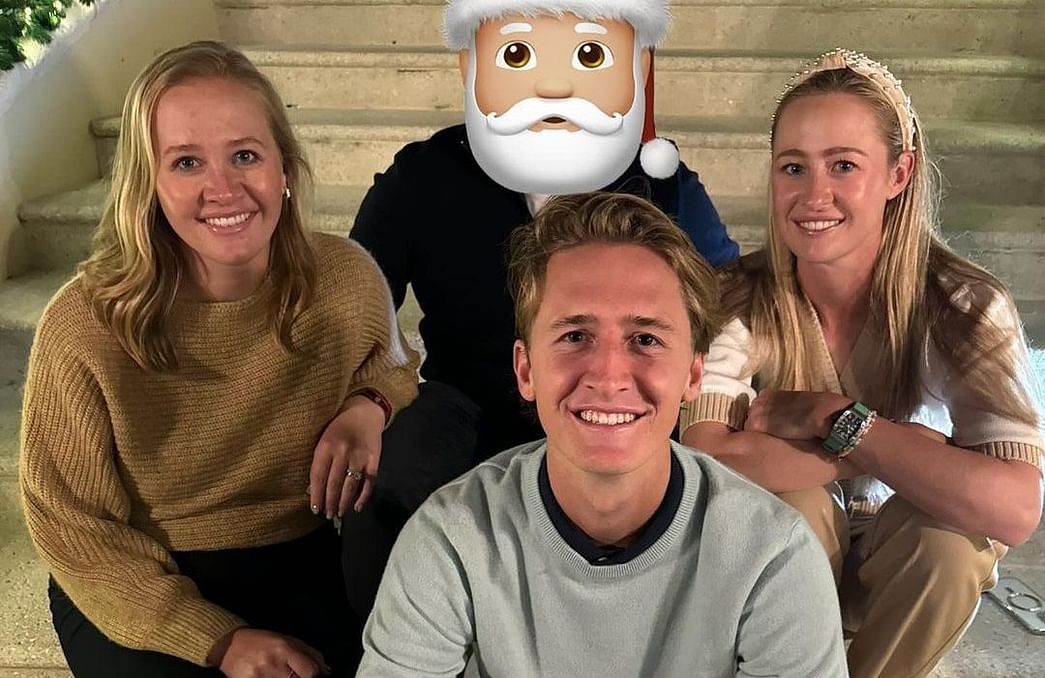The occasion? A celebration — and retrospective — of a career well played. The 29-year-old, who lives 45 minutes southeast, in Delray Beach, and is among a handful of top-tier pros to hold a membership at Panther, is calling it a career at the end of the 2024 LPGA season.
Why would one of America’s brightest stars hang up her cleats at an age when many of the world’s best players are only just entering their competitive prime?
“I don’t think there’s anything really for me to prove,” Thompson says. “I’m forever grateful for being able to play golf for a living. But a lot of people don’t see the lonely times — going through the airport alone, going to the hotel alone with four or five bags and performing, then being alone. Good or bad, you don’t have someone to share it with most of the time.”
Thompson’s yearning for a break from the isolating grind of pro golf is understandable. She first entered the public consciousness as a prodigious 12-year-old qualifier at the 2007 U.S. Women’s Open, and she hasn’t missed a national championship since. At 16, she won her first LPGA title and successfully petitioned the LPGA for membership. More wins followed, including her first and, to date, only major championship: the Kraft Nabisco Championship (now the Chevron Championship) in 2014.
Thompson — who grew up in nearby Coral Springs in a household of competitive golfers (both of her brothers, Nicholas and Curtis, have had modest pro careers) shepherded by her parents, Scott and Judy — was an American darling from the moment she entered the pro scene, inspiring legions of young fans with her dazzling looks, bombs off the tee and a seemingly infinite willingness to sign autographs and engage with fans.
“I’ve always just wanted to be able to give back to the game, to leave it in a better place,” she says. “And that’s hopefully what people look to me as — not only a golfer but a great person that has given back, good or bad day.”
Even in the wake of devastating heartbreaks at major championships — a four-shot penalty that derailed her during the final round of the 2017 ANA Inspiration, a five-shot lead evaporating on the back nine of the 2021 U.S. Women’s Open, four back-nine bogeys to come up short at the 2022 KPMG — Thompson never lost sight of her personal mission to serve her fans and to help elevate the women’s game.
In our wide-ranging chat, she plumbs the depths of her disappointments and delivers a candid assessment of the joys and difficulties she’s endured in her life and career. But even as Thompson’s LPGA career winds down, a new chapter awaits. And the future is bright indeed.
GOLF: At the U.S. Women’s Open in May, you announced that the 2024 LPGA season would be your last full season. Is this a true retirement or just scaling back?
Lexi Thompson: I’m definitely stepping away from a full-time golf schedule, so I won’t be out there every single week or back-to-back weeks. Just taking a little time away from the game and making more time for myself and my family and my loved ones.
G: How have you felt since making that announcement?
LT: A mix of emotions. It’s been on my mind for quite some time, but to have it out there in the open that week was very special. And I had my family there to support me. It was a lot of tears, a lot of emotions. But I’ve felt the love from everybody around me — my fans, family, friends — so it’s meant the world.
G: You’re 29 years old. You’ve been competing on the LPGA Tour as a pro since you were 16. Has retirement been something you’ve been thinking about for a long time? Did you always have an end date in mind?
LT: As an athlete starting your career, you never think about the end. You never want to put a dead timeline on something. You’re just enjoying the process of learning and experiencing the journey. But I would say I’ve thought about it for a few years now. It’s definitely been on my mind, seeing that there’s more to life — having a family, getting to experience travel, getting to see places and enjoy life more. I’ve known golf my whole life — I started tournaments when I was seven. And training my whole life, too, so I’ve really not known any different. So, to be able to give myself the relief that there is light at the end of the tunnel… Of course, I’ve enjoyed every bit of it, but there’s been a lot of downs. There’s been a lot of things that have been thrown at me on the golf course that I never thought would [have been], and it’s hurt. It’s put me through some really down times that I never thought I would experience and [did] not know how to deal with. But whether it’s in sports or not, we all have our things that we go through.
G: There are still a few months left in this LPGA season. Would winning again change your mind or make any difference at all?
LT: It wouldn’t make a difference. But, like I said, I’m just stepping away from a full-time schedule. I might tee it up a few more times next year, but I’m going to take time for myself, time away and, if I feel good about it, a lot more life to be lived. And if I don’t, and I still want to tee it up and play in front of my fans, I will.
G: What does taking time for yourself look like?
LT: Just having quality time with my family, my spouse, and just enjoying that time for me — getting to experience life, travel, take up another sport or another hobby. It’s time to be able to go to bed at night and not worry about the next day and how I’m going to perform and how I’m going to feel — or how people are going to see me — because of it. Just giving my mind that mental shutdown and feeling okay with myself; not having to perform and be this perfect person — that’s what I’m probably looking forward to the most.
G: Are you married?
LT: No. I’m not married.
G: Just checking. Thought there might be a secret marriage to reveal.
LT: No, no, no. I am in a relationship but not married. Hopefully, one day.
G: Let’s do a quick résumé recap. You have 11 LPGA wins, including a major. Six, soon to be seven Solheim Cup appearances, two Olympics. You recently competed on the PGA Tour, coming this close to making the cut. Do you feel satisfied with that list of accomplishments?
LT: I definitely do. Of course, with the amount of time and training I’ve put into my life and my career, I always feel like I should accomplish more. But I always have to remind myself to read that list, because, being an athlete, sometimes you never think you’re good enough because, in golf, you lose more than you win.
G: You mentioned how much more to life there is than golf. You were homeschooled after elementary school, and you didn’t go to college. You played your first U.S. Women’s Open at age 12, and you were playing as a professional at age 16. When you look back, do you feel you missed out on anything?
LT: I’ve gotten that question quite a bit, and it’s tough because I don’t feel that I’ve missed out because I also feel like I’ve gained so much experience, whether it’s from meeting people, getting to travel the world at 14, 15 years old. I’ve gotten to experience a life that people dream of, so I’m grateful for that. Do I feel like I’ve missed out on the college experience and going to high school? Of course, yes. But, big picture, no. I knew golf is what I wanted to do at the age of 12, and I knew the only way I could play against the best was if I sacrificed going to school.
G: You mentioned how glamorous your life can look from the outside and how difficult it can be in the behind-the-scenes moments. And you’ve endured some agonizing defeats at the majors in recent years: the ANA in 2017, the 2021 U.S. Women’s Open at Olympic, the 2022 KPMG at Congressional. How did those experiences shape you?
LT: I still think about them quite a bit because they were huge moments in my career. I learned a lot about myself and how strong I am to be able to get through those things. But, yeah, I’m not going to sit here and say, “Oh, I learned so much,” and that’s all. They hurt, especially ANA. [Ed. note: After holding a two-shot lead with six holes to play in the final round, Thompson was assessed a four-shot penalty for incorrectly replacing her ball during the third round — an infraction that was called in by a TV viewer. She ultimately lost the tournament in a playoff.] I think I locked myself in the room after it happened. I cried the whole night. I didn’t want anybody near me. It was like my dream was just ripped right from my hands, because that was a tournament I always imagined I would win. So, to have that taken away for something that I didn’t even realize [I did], that I would never do, and then to be called a cheater and a choker for all these incidents, I’m like, Why do I deserve this? I’m out here busting my butt, trying to win these tournaments and come out on the top, with all the training and practicing I’ve done. And to not be able to either come down the stretch with a win — and to hear the things people say — it’s just, nobody deserves it. I struggle with it to this day, and I’ve [sought] a lot of help for it, which I think everybody should do because, in the moment, sometimes you’re like, Oh, I just want to deal with it alone. But it’s probably the worst thing you can do. You have to surround yourself with the people that love you and have their support to get through those tough times, because going through it alone is the worst possible thing. A lot of the time I do. I struggle alone.



